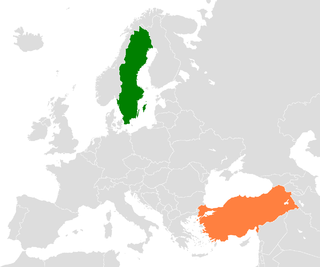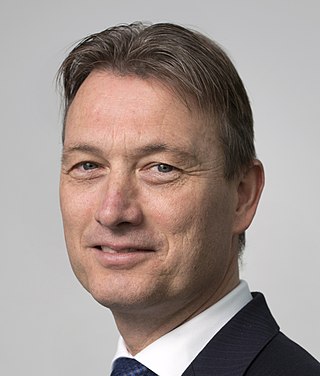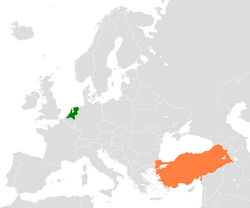
General elections were held in the Netherlands on 22 November 2006, following the fall of the Second Balkenende cabinet. The election proved relatively successful for the governing Christian Democratic Appeal (CDA) which remained the largest party with 41 seats, a loss of only three seats. The largest increase in seats was for the Socialist Party (SP), which went from nine to 25 seats. The main opposition party, the social democratic Labour Party (PvdA) lost nine of its 42 seats, while the right-liberal People's Party for Freedom and Democracy (VVD) and the progressive liberal Democrats 66 lost a considerable portion of their seats, six of 28 and three of six, respectively. New parties, such as the right-wing Party for Freedom (PVV) of former VVD MP Geert Wilders and the animal rights party Party for the Animals (PvdD) were also successful, with the PVV winning nine seats and the PvdD winning two, thereby becoming the first animal rights group to enter a European parliament.
Turks in the Netherlands refers to people of full or partial Turkish ethnicity living in the Netherlands. They form the largest ethnic minority group in the country; thus, the Turks are the second-largest ethnic group in the Netherlands after the ethnic Dutch. The majority of Dutch Turks descend from the Republic of Turkey; however, there has also been significant Turkish migration waves from other post-Ottoman countries including ethnic Turkish communities which have come to the Netherlands from the Balkans, the island of Cyprus, as well as from other parts of the Levant. More recently, during the European migrant crisis significant waves of Turkish minorities from Syria and Kosovo have also arrived in the Netherlands. In addition, there has been migration to the Netherlands from the Turkish diaspora; many Turkish-Belgians and Turkish-Germans have arrived in the country as Belgian and German citizens.

German–Turkish relations have their beginnings in the times of the Ottoman Empire and they have culminated in the development of strong bonds with many facets that include economic, military, cultural and social relations. With Turkey as a candidate for the European Union, of which Germany is the largest member, and the existence of a significant Turkish diaspora in Germany, these relations have become more and more intertwined over the decades. Relations with Turkey significantly deteriorated after the 2016–17 Turkish purges including the arrest of journalists such as Die Welt's Deniz Yücel. Both countries are members of the Council of Europe and NATO. Germany opposes Turkey's European Union membership.

Russia–Turkey relations are the bilateral relations between Russia and Turkey and their antecedent states. Relations between the two are rather cyclical. From the late 16th until the early 20th centuries, relations between the Ottoman and Russian empires were normally adverse and hostile and the two powers were engaged in numerous Russo-Turkish wars, including one of the longest wars in modern history. Russia attempted to extend its influence in the Balkans and gain control of the Bosphorus at the expense of the weakening Ottoman Empire. As a result, the diplomatic history between the two powers was extremely bitter and acrimonious up to World War I. However, in the early 1920s, as a result of the Bolshevik Russian government's assistance to Turkish revolutionaries during the Turkish War of Independence, the governments' relations warmed. Relations again turned sour at the end of WWII as the Soviet government laid territorial claims and demanded other concessions from Turkey. Turkey joined NATO in 1952 and placed itself within the Western alliance against the Warsaw Pact during the Cold War, when relations between the two countries were at their lowest level. Relations began to improve the following year, when the Soviet Union renounced its territorial claims after the death of Stalin.

Turkey and Ukraine have a long chronology of historical, geographic, and cultural contact. Diplomatic relations between both countries were established in early 1990s when Turkey became one of the first states in the world to announce officially about recognition of sovereign Ukraine. Turkey has an embassy in Kyiv and a consulate general in Odesa. Ukraine has an embassy in Ankara and a consulate general in Istanbul. Turkey is a full member of NATO and Ukraine is a candidate. Also both countries are BLACKSEAFOR and BSEC members.

Swedish–Turkish relations are foreign relations between Sweden and Turkey. Both countries are full members of the Council of Europe, NATO, the Organisation for Economic Co-operation and Development (OECD), the Organization for Security and Co-operation in Europe (OSCE) and the Union for the Mediterranean.

Mexico–Turkey relations are foreign relations between Mexico and Turkey. Both nations are members of the OECD and the United Nations.

Serbian–Turkish relations are foreign relations between Serbia and Turkey. Serbia has an embassy in Ankara and a consulate-general in Istanbul. Turkey has an embassy in Belgrade. Both countries are full members of the Council of Europe, the Organization for Security and Co-operation in Europe (OSCE), the Central European Free Trade Agreement (CEFTA) and the Organization of the Black Sea Economic Cooperation (BSEC). Turkey is a member of NATO. Serbia instead is not a member of NATO.

Turkey–Syria relations are the relations between Turkey and the Syrian Arab Republic. Turkey shares its longest common border with Syria; various geographic and historical links also tie the two neighbouring countries together.

Dutch–Turkish relations are the bilateral relations between the Netherlands and Turkey. The diplomatic relations widely encompass and span four centuries, beginning in 1612. The first Turkish representative in the Netherlands started activities in 1859.

Mevlüt Çavuşoğlu is a Turkish diplomat and politician who is currently a member of the Grand National Assembly. He also served as the Minister of Foreign Affairs of Turkey from August 2014 to August 2015, and again from 24 November 2015 to 6 June 2023.

Halbe Zijlstra is a retired Dutch politician who served as Minister of Foreign Affairs from 26 October 2017 to 13 February 2018 in the Third Rutte cabinet. He is a member of the People's Party for Freedom and Democracy (VVD).

The second Rutte cabinet, also called the Rutte–Asscher cabinet, was the executive branch of the Government of the Netherlands from 5 November 2012 until 26 October 2017. The cabinet was formed by the conservative-liberal People's Party for Freedom and Democracy (VVD) and the social-democratic Labour Party (PvdA) after the election of 2012. The cabinet was a centrist grand coalition and had a slim majority in the House of Representatives. VVD Leader Mark Rutte served as Prime Minister; prominent PvdA politician Lodewijk Asscher, a former alderman of Amsterdam, served as Deputy Prime Minister and Minister of Social Affairs and Employment.

Fatma Betül Sayan Kaya is a Turkish politician who serves as the Minister of Family and Social Policies since 24 May 2016. Sayan Kaya is the vice-chair of the Justice and Development Party (AKP) responsible for foreign affairs.

On 15 July 2016, a faction within the Turkish Armed Forces, organized as the Peace at Home Council, attempted a coup d'état against state institutions, including the government and president Recep Tayyip Erdoğan. They attempted to seize control of several places in Ankara, Istanbul, Marmaris and elsewhere, such as the Asian side entrance of the Bosphorus Bridge, but failed to do so after forces and civilians loyal to the state defeated them. The Council cited an erosion of secularism, elimination of democratic rule, disregard for human rights, and Turkey's loss of credibility in the international arena as reasons for the coup. The government said it had evidence the coup leaders were linked to the Gülen movement, which is designated as a terrorist organization by the Republic of Turkey and led by Fethullah Gülen, a Turkish businessman and a well-known Islamic scholar who lives in exile in Pennsylvania. The Turkish government alleged that Gülen was behind the coup and that the United States was harboring him. Events surrounding the coup attempt and the purges in its aftermath reflect a complex power struggle between Islamist elites in Turkey.

Erik-Jan Zürcher is a Dutch Turkologist. He is a professor of Turkish studies at Leiden University since 1997. From 2008 to 2012 he served as director of the International Institute of Social History. His book Turkey: a Modern History is considered a standard work. Zürcher frequently comments on current issues related to Turkey.

A constitutional referendum was held in Turkey on 16 April 2017 on whether to approve 18 proposed amendments to the Turkish constitution that were brought forward by the governing Justice and Development Party (AKP) and the Nationalist Movement Party (MHP). As a result of its approval, the office of Prime Minister was abolished and the existing parliamentary system of government was replaced with an executive presidency and a presidential system. The number of seats in Parliament was raised from 550 to 600, while, among a series of other proposals, the president was given more control over appointments to the Supreme Board of Judges and Prosecutors (HSYK). The referendum was held under a state of emergency that was declared following the failed military coup attempt in July 2016.

Denk is a political party in the Netherlands, founded on a minority rights platform. It is legally registered as "Politieke Beweging Denk".

The public image of Recep Tayyip Erdoğan concerns the image of Recep Tayyip Erdoğan, current President of Turkey, among residents of Turkey and worldwide.

Sofagate is a diplomatic protocol incident that happened during the visit of President of the European Commission Ursula von der Leyen and President of the European Council Charles Michel to Turkey in April 2021. When Michel and von der Leyen were to meet with the Turkish President Recep Tayyip Erdoğan and Foreign Minister Mevlüt Çavuşoğlu, there were only two chairs and two sofas in the room in which they were received. Michel then seated himself in the chair beside Erdoğan while von der Leyen was offered to take a seat on a sofa in the same room across the Turkish Foreign Minister Mevlüt Çavuşoğlu. Michel as a man took the more prominent position than von der Leyen as a woman, despite both having the title President. Many commentators described the incident as sexist, as did von der Leyen herself. Later on, Çavuşoğlu called the accusations against Turkey "unfair", saying that the seating arrangement was made in accordance with the requests of the European side and added protocol officials always "meet and discuss the arrangement before each visit."






















